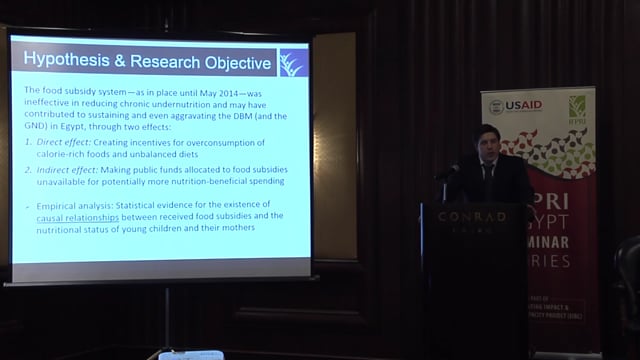Egypt is a special case among middle-income countries in terms of nutrition: Rather than seeing a drop in chronic child undernutrition during its high-growth period in the 2000s, Egypt experienced a rise in child stunting and a further increase in the “double burden of malnutrition”—that is, the simultaneous presence of chronic undernutrition and overnutrition. What made the Egyptian case exceptional, and how can the country address these challenges?
The new book Nutrition and Economic Development: Exploring Egypt’s Exceptionalism and the Role of Food Subsidies, by Olivier Ecker, Perrihan Al-Riffai, Clemens Breisinger, and Rawia El-Batrawy, examines the drivers of Egypt’s nutritional challenges and the effects of the country’s food subsidy system in particular.
At a recent panel discussion in Cairo, part of the USAID-funded, IFPRI-implemented series “Evaluating Impact and Building Capacity,” two of the book’s authors, along with two representatives from key government ministries, discussed the role of food subsidies in creating and perpetuating the double burden of malnutrition in Egypt. While subsidies alone are not to blame for overnutrition and undernutrition, reforming the subsidy system could help alleviate these burdens.
Egypt’s food subsidy system has been in place in various forms since the early 1940s. Its goal has been to feed the needy. Yet by subsidizing foods such as bread, sugar, edible oil, and rice that are high in calories but poor in vitamins and minerals, the system has inadvertently incentivized people to consume too much cheap, calorie-rich food lacking in nutritional value. In 2014, Egypt began reforming the program, and in 2015 it launched two conditional cash-transfer programs: Takaful and Karama, targeted at families and the poor, respectively.
Clemens Breisinger, leader of IFPRI’s Egypt country program, noted that the discussion was not aimed at determining whether food subsidies or Conditional Cash Transfers (CCTs) are better. In the short run, both are important. Rather, the purpose of the panel was to share ideas for the medium term and to explore ways of fine-tuning existing programs.
Doing so is important because, as Olivier Ecker, IFPRI research fellow and lead author of the book, explained, “malnutrition deepens poverty, slows economic growth, and lowers educational and income opportunities.” Moreover, overweight and obesity can lead to a rise in non-communicable diseases such as type 2 diabetes, which increase private and public healthcare costs. It is therefore critical that Egypt continue the reform process it began in 2014.
There are four key drivers of malnutrition in Egypt—the nutrition transition, economic crisis and rising poverty, insufficient nutrition-sensitive investment, and the subsidy system. The first three drivers alone cannot explain Egypt’s exceptionally high prevalence of the double burden of malnutrition and regional patterns of over- and undernutrition. This raises the question: Did food subsidies contribute to the double burden of malnutrition, which is as common among the rich as the poor, becoming even more widespread? To answer this question, the authors of Nutrition and Economic Development studied Egypt’s subsidies for traditional Baladi flatbread and flour as well as its ration card program. One of several key findings was that rich beneficiaries received more benefits per person under the ration card program than did poor beneficiaries.
Based on a unique dataset that included detailed, household-level information, the book provides a strong rationale for reforming Egypt’s food-subsidy system. In particular, it shows that nutritional concerns must be taken into consideration; that subsidies for calorie-rich, non-staple foods that are low in nutrients should be abolished; and that the fixed-price regime of the subsidy system should be phased out gradually in order to avoid price distortions.
Ahmed Khorshed, advisor to Egypt’s minister of supply and internal trade, affirmed the Egyptian government’s strong commitment to reform and innovation. “Feeding one’s people means they will be healthy, will work, will be productive, and will pay less money for hospitals and medicine,” Khorshed said. “Everyone must have a safe, balanced diet that is within his income.” Khorshed also focused on the importance of educating the people not only to consume more nutritious diets but also not to waste food.
Finally, Raafat Shafeek, a representative of Egypt’s Ministry of Social Solidarity, presented some of the early achievements of the Takaful and Karama programs currently underway in all 27 governorates, including conditionality, automation (electronic database), wider outreach (deprived areas and proper targeting of CCTs), improved accountability measures, and a limited period of eligibility for the programs. But there was broad agreement among the panelists that in the short run—and in the current context of ongoing macroeconomic reforms—both the food subsidies and the Takaful and Karama programs provide important social protections in Egypt.
The panel concluded with a video presentation by Santiago Levy Algazi, former deputy minister of finance in Mexico and architect of that country’s pathbreaking CCT program. Levy emphasized that educating the public on what constitutes a nutritional diet will be an important component of any effort to reduce malnutrition. He explained that by making cash transfers conditional on certain household behaviors, Mexico succeeded in getting more people to health clinics, keeping more children in school, and teaching more families how to eat healthfully.
Although there is no such thing as a one-size-fits-all social-protection program, the lessons from Mexico’s experience are informative and important for the ongoing reform of Egypt’s social safety net. Moreover, panelists agreed that improving nutrition in Egypt will ultimately be a collaborative process between the government and the people.
Tracy Brown is a senior editor in IFPRI’s Communications and Knowledge Management Division.







